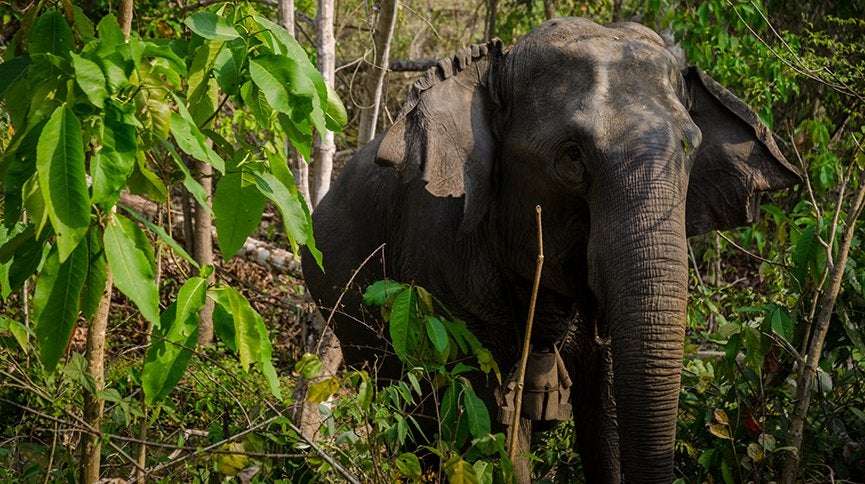Capturing elephants from the wild hinders their reproduction for over a decade
Scientists at the University of Sheffield have studied how capturing Asian elephants negatively affects their reproduction
The research found that capturing wild elephants not only negatively affects their reproduction immediately, but also any calves born to captured female elephants are less likely to survive
Millions of animals all over the world are removed from the wild and placed in captivity either for conservation, research or economic purposes
Capturing elephants to keep in captivity not only hinders their reproduction immediately, but also has a negative effect on their calves, according to new research.
Scientists from the University of Sheffield have found long-lasting negative effects on the reproduction of Asian elephants captured from the wild and kept in captivity, in a joint study with the University of Turku and the Myanma Timber Enterprise (MTE).
Asian elephants caught from the wild were less likely to reproduce in their lifetime and started reproducing later, with these reductions lasting for over a decade. Researchers also found that this had a negative effect on the next generation, with calves born to captured mothers having reduced survival rates.
Approximately 16,000 Asian elephants are held in captivity in countries like Myanmar, India and Thailand, mainly used to drag logs in the timber industry or for tourism. To sustain these industries, elephants continue to be captured from the wild, but the long term impact of this for the elephants is less studied.
With so many wild animals kept in captivity, often to try and protect threatened species, understanding how captivity affects animals in the long term is important to improve conservation efforts.
John Jackson, lead author of the study and PhD Researcher at the University of Sheffield, said: “Conservation programmes that include captive breeding or captive management need to consider that taking individuals from the wild can influence animals for many years, and this may hinder future conservation efforts.
“The finding of long-lasting negative effects of capturing wild animals is important not only to sustain elephant populations in the future, but also for many other species that are taken from the wild.”
Professor Virpi Lummaa, Associate of the University of Sheffield’s Department of Animal and Plant Sciences from the University of Turku, said: “The key thing that we found here is that the negative effects of taking animals out of the wild can last for decades, and have knock on effects for generations in captivity.
“This is something conservationists have to consider when capturing animals, because even if we re-create good conditions in captivity, the animals may still struggle to reproduce.”
Researchers also looked at the reasons why the calves of captured elephants suffered.
Mirkka Lahdenperä, PhD Researcher and co-lead of the study from the University of Turku, said: “We think that the stress imposed by the capture of elephants, which can negatively influence a whole host of processes in the animal such as the development of the foetus, body condition and social interactions, is the key reason we see such big reductions in reproduction.”

GWJYonder on October 11st, 2019 at 15:44 UTC »
I wonder if the effect exists, or is at least less pronounced, if the wild animal is captured for different purposes. I imagine that adjusting to life in a zoo with a large enclosure is less stressful than adjusting to life of hard labor in the timber industry. I suppose there is even a chance that the effect is greater in a zoo, as the working elephant may get more exercise, but I doubt it.
foo337 on October 11st, 2019 at 12:59 UTC »
I mean its pretty common with a lot of non domesticated animals so im not super surprised
QuietCakeBionics on October 11st, 2019 at 11:49 UTC »
Link to paper:
https://royalsocietypublishing.org/doi/10.1098/rspb.2019.1584
Abstract:
Capturing wild animals is common for conservation, economic or research purposes. Understanding how capture itself affects lifetime fitness measures is often difficult because wild and captive populations live in very different environments and there is a need for long-term life-history data. Here, we show how wild capture influences reproduction in 2685 female Asian elephants (Elephas maximus) used in the timber industry in Myanmar. Wild-caught females demonstrated a consistent reduction in breeding success relative to captive-born females, with significantly lower lifetime reproduction probabilities, lower breeding probabilities at peak reproductive ages and a later age of first reproduction. Furthermore, these negative effects lasted for over a decade, and there was a significant influence on the next generation: wild-caught females had calves with reduced survival to age 5. Our results suggest that wild capture has long-term consequences for reproduction, which is important not only for elephants, but also for other species in captivity.